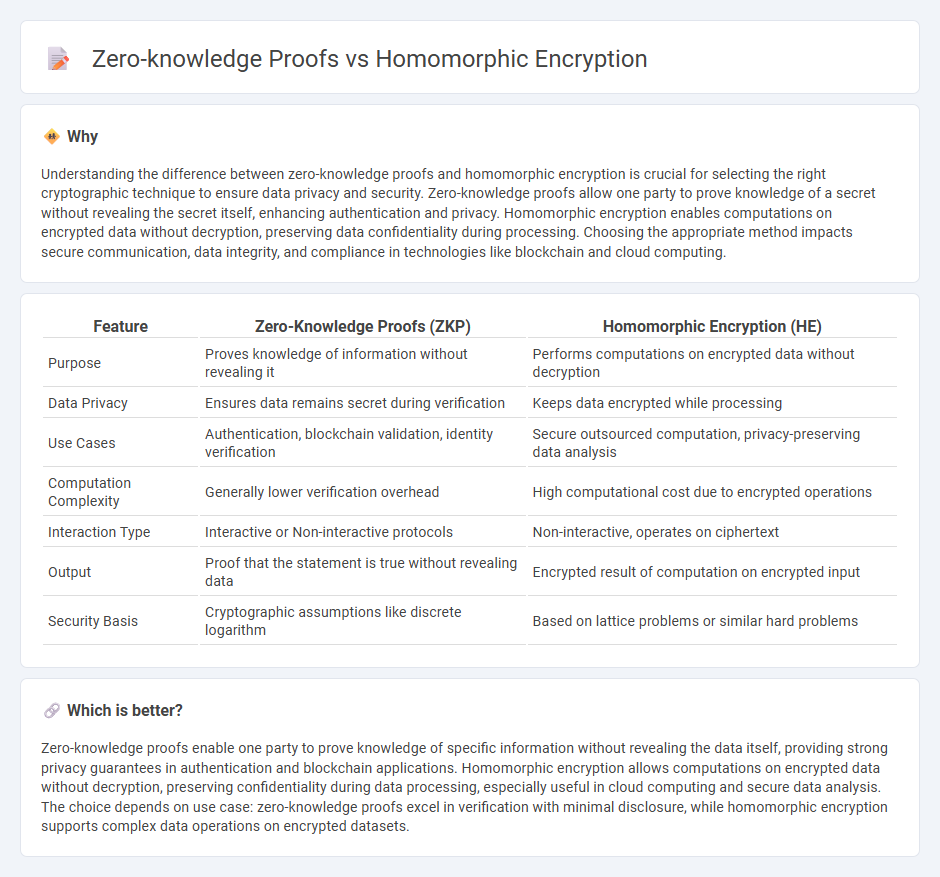
Zero-knowledge proofs enable one party to prove knowledge of specific information without revealing the information itself, enhancing privacy in digital transactions. Homomorphic encryption allows computations on encrypted data without decryption, preserving confidentiality while enabling cloud-based processing. Explore the unique advantages and applications of zero-knowledge proofs and homomorphic encryption to understand their impact on secure technology solutions.
Why it is important
Understanding the difference between zero-knowledge proofs and homomorphic encryption is crucial for selecting the right cryptographic technique to ensure data privacy and security. Zero-knowledge proofs allow one party to prove knowledge of a secret without revealing the secret itself, enhancing authentication and privacy. Homomorphic encryption enables computations on encrypted data without decryption, preserving data confidentiality during processing. Choosing the appropriate method impacts secure communication, data integrity, and compliance in technologies like blockchain and cloud computing.
Comparison Table
| Feature | Zero-Knowledge Proofs (ZKP) | Homomorphic Encryption (HE) |
|---|---|---|
| Purpose | Proves knowledge of information without revealing it | Performs computations on encrypted data without decryption |
| Data Privacy | Ensures data remains secret during verification | Keeps data encrypted while processing |
| Use Cases | Authentication, blockchain validation, identity verification | Secure outsourced computation, privacy-preserving data analysis |
| Computation Complexity | Generally lower verification overhead | High computational cost due to encrypted operations |
| Interaction Type | Interactive or Non-interactive protocols | Non-interactive, operates on ciphertext |
| Output | Proof that the statement is true without revealing data | Encrypted result of computation on encrypted input |
| Security Basis | Cryptographic assumptions like discrete logarithm | Based on lattice problems or similar hard problems |
Which is better?
Zero-knowledge proofs enable one party to prove knowledge of specific information without revealing the data itself, providing strong privacy guarantees in authentication and blockchain applications. Homomorphic encryption allows computations on encrypted data without decryption, preserving confidentiality during data processing, especially useful in cloud computing and secure data analysis. The choice depends on use case: zero-knowledge proofs excel in verification with minimal disclosure, while homomorphic encryption supports complex data operations on encrypted datasets.
Connection
Zero-knowledge proofs and homomorphic encryption are interconnected through their role in enhancing data privacy and security in cryptographic systems. Zero-knowledge proofs enable one party to prove knowledge of information without revealing the information itself, while homomorphic encryption allows computations on encrypted data without decryption. Combining these technologies facilitates secure and privacy-preserving computations, crucial for applications in blockchain, secure voting, and confidential data analysis.
Key Terms
Computation on Encrypted Data
Homomorphic encryption enables direct computation on encrypted data without decryption, preserving privacy while allowing data processing and analysis. Zero-knowledge proofs verify the truth of a statement without revealing the underlying data, focusing on authenticity rather than computation. Explore the core differences and applications of these cryptographic techniques to understand their impact on secure data computation.
Privacy-Preserving Verification
Homomorphic encryption enables computations on encrypted data without revealing the underlying information, preserving privacy while allowing data processing. Zero-knowledge proofs allow one party to prove the validity of a statement without disclosing any additional information, ensuring secure verification. Explore the distinct advantages of these technologies for advanced privacy-preserving verification methods.
Cryptographic Protocols
Homomorphic encryption enables computation on encrypted data without decryption, preserving privacy in data processing, while zero-knowledge proofs allow one party to prove knowledge of information without revealing the underlying data, enhancing authentication and verification protocols. Both are critical cryptographic protocols in secure data handling and trustless environments, supporting blockchain, secure voting, and confidential transactions. Explore more about how these protocols revolutionize data privacy and security applications.
 dowidth.com
dowidth.com